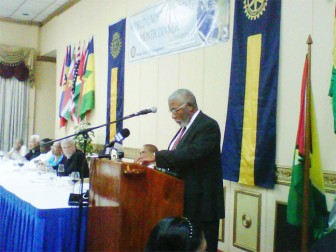Drugs pose a serious threat to democracy and the general way of life in the Caribbean region and governments continue to ignore the root causes of crime while treating the symptoms, according to Rear-Admiral Hardley Lewin, former chief of staff of Jamaica Defence Force.
The movement of illicit drugs across the region is linked to increased levels of crime and violence, corruption, the trade of illegal arms and ammunition and a negative reputation for nationals, Admiral Lewin said on Friday, while noting that Jamaicans and Guyanese “feel it”.

Under the theme, ‘Drugs, Crime and the Threats to Caribbean Security’, Lewin addressed the World Understanding Dinner 2011 hosted by the Rotary Club of Georgetown at the Pegasus Hotel and he wasted little time in saying that the strategies employed over the years to tackle the issues have missed the mark.
“Is the high rate of crime and violence the problem or is it mere symptoms of much deeper problems?” he asked, noting that governments have tended to respond to the symptoms, that is, the crime and violence, through coercive strategies rather than engaging the causes and symptoms through multi-dimensional strategies.
He argued that political, business, law enforcement, socio-economic/socio-cultural and civil society are the dimensions at the root of and giving rise to increasing levels of crime and violence; the symptom. “I submit that any intervention strategy by regional governments must address all the above mentioned dimensions simultaneously if the aim is to realize long-term sustainable reductions in crime and violence,” he said.
Criminal deportees primarily from the USA, UK and Canada returning to their countries of origin in the region are an area of concern, the admiral said, though he observed that their full impact on the increased levels of crime and violence is still being debated.
At the political level, he opined the region has practiced a kind of politics that has had the most divisive effect on people, and the most corrosive and corrupting influence on individuals and national institutions. “In the management of our affairs as sovereign and independent states there is little doubt that we have lost our way,” he charged.
A critical issue such as national security should not be used a political football between contending parties, he declared, pointing out that it requires a united front and a fixity of purpose. He said too that political parties’ interest taking priority over national interest, where it occurs, certainly does not promote good governance.
“Ever so often we hear that we declare war on drugs or war on crime but we never hear of a declaration of war on hopelessness,” he said, reiterating that the focus needs to be on the root causes and not on the symptoms. This statement came as he addressed socio-economic issues and according to him, poor healthcare, poor education and poor living conditions; injustice, over-breeding and alienation can be summed up in one word, hopelessness. Hopelessness, he added, provides fertile breeding grounds for new recruits into gangs and criminal networks.
The admiral, who resigned as Jamaica’s Police Commissioner in 2009, observed that law enforcement agencies, namely, police forces across the region need a radical transformation plan designed to re-orient and refocus them to be deliverers of service rather than instruments for the application of force. What the region inherited from the British, he said, was a police force resembling a paramilitary. “They were never designed to be friendly to their own people,” he said of the paramilitary forces.
With respect to regional businesses, he said selfishness and greed are associated with some commercial practices where every opportunity is used to squeeze and milk the consumer of what little money he has. However, he said, they need to be reminded that the fortunes of the haves are inextricably linked to the fortunes of the have-nots.
“It seems to me that civil society fell asleep over the last several decades. What else can explain why we were content to sit back and accept a steadily deteriorating situation?” the admiral said. He noted that it was probably easier for many to cut and run by emigrating rather than to remain and let their voices be heard.
He declared that there is no single rallying point or event that unites the region as a people, adding, “we never fought, bled and died for our independence”.
He said this probably explains why political parties could easily divide people into two political tribes. “When your party is in power you are well fed at the trough and when your party is out of power you suck salt. So we put brother against brother, friend against friend, and winning at all cost becomes the objective even if violence and murder becomes the means,” he added.





